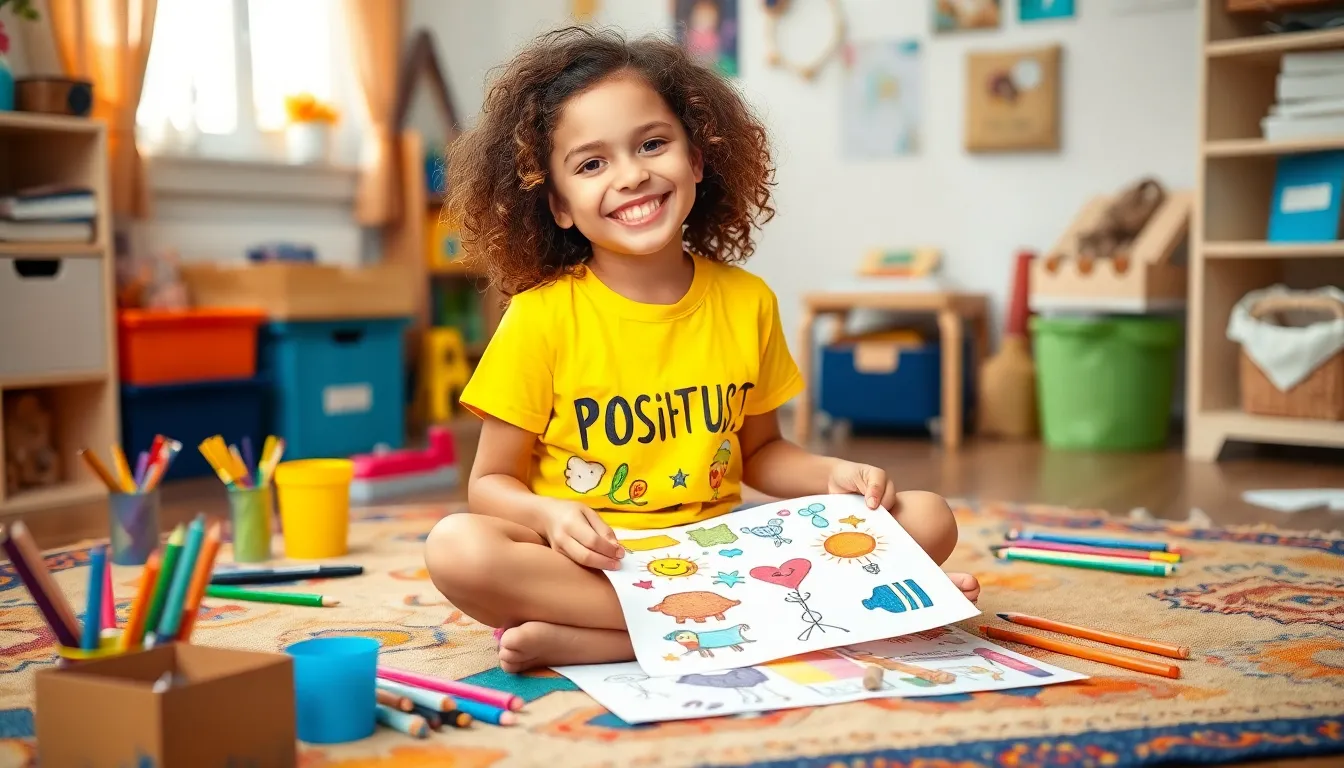In a world where kids are juggling school, friendships, and the occasional existential crisis about broccoli, mental health isn’t just a grown-up topic anymore. It’s vital to equip them with the right tools to navigate their emotions. Enter mental health quotes for kids! These little nuggets of wisdom can spark conversations, boost resilience, and maybe even make them giggle while they’re at it.
Imagine a child reading a quote that resonates with them, lighting up their face like they’ve just discovered the secret to the universe—or at least the secret to surviving a math test. These quotes not only provide comfort but also encourage kids to express their feelings and understand that it’s okay to not be okay. With the right words, kids can learn to embrace their emotions, making the journey through childhood a bit brighter and a lot more fun.
Table of Contents
ToggleThe Importance of Mental Health for Kids
Mental health is crucial for children’s overall well-being. It supports their growth, learning, and development.
Understanding Mental Health
Understanding mental health involves recognizing children’s emotional and psychological needs. Mental health influences how they think, feel, and act. It affects their relationships with others and their ability to cope with stress. Children may face challenges like anxiety or depression affecting their daily lives. Identifying these issues early leads to better support and intervention. Prioritizing mental health fosters resilience and emotional intelligence. Engaging with kids about their feelings establishes a safe environment for expression.
Why Quotes Matter
Quotes can serve as powerful tools to inspire children. They offer simple yet profound messages that resonate with young minds. Sharing relatable quotes helps kids find comfort in difficult situations. Resiliency often stems from understanding that others experience similar feelings. Quotes spark conversations about emotions, encouraging discussions between kids and caregivers. Motivational phrases empower children to face challenges head-on. They also remind kids of their strength and ability to overcome obstacles.
Inspiring Mental Health Quotes for Kids


Kids can benefit significantly from mental health quotes that uplift their spirits and guide their emotional journeys. These quotes serve not only to inspire but also to create a nurturing environment for their mental well-being.
Uplifting Quotes to Promote Positivity
- “You are braver than you believe, stronger than you seem, and smarter than you think.” – A.A. Milne
- “Mistakes are proof that you are trying.” – Jennifer Lim
- “Believe you can, and you’re halfway there.” – Theodore Roosevelt
- “Every day may not be good, but there’s something good in every day.” – Alice Morse Earle
- “Just keep swimming.” – Dory, Finding Nemo
These uplifting quotes encourage kids to adopt a positive mindset. Each quote reminds them of their innate strength and ability to overcome obstacles. They foster resilience, helping children face challenges with courage and optimism.
Quotes That Encourage Emotions
- “It’s okay to be sad sometimes.” – Unknown
- “Feelings are like waves; they come and go.” – Unknown
- “Your feelings are valid.” – Unknown
- “Talking about your feelings helps them feel lighter.” – Unknown
- “You don’t have to be happy all the time.” – Unknown
Emotion-focused quotes provide essential validation for children experiencing various feelings. These quotes promote healthy expression and understanding of emotions. They encourage kids to embrace their feelings, fostering open conversations about mental health.
Using Quotes in Daily Conversations
Quotes can help normalize discussions about feelings and mental health. By weaving quotes into conversations, adults can guide children through their emotional landscapes.
Incorporating Quotes in Family Discussions
Incorporating quotes during family discussions fosters emotional intelligence. Parents can start by sharing a quote that resonates with a child’s current feelings. For example, when discussing challenges, using a quote about resilience can spark valuable conversations. Kids learn through examples, so they might respond positively when they hear reassuring words. Sharing a favorite quote during mealtime offers an opportunity for open dialogue. Family discussions become a space for kids to express their experiences and thoughts, building stronger connections.
Sharing Quotes at School
Sharing quotes at school enhances peer discussions and promotes mental health awareness. Teachers can introduce a relevant quote at the beginning of the week, encouraging students to reflect. Incorporating quotes into assignments allows students to explore their interpretations, fostering creativity. When children share quotes with friends, it normalizes conversations about feelings and helps in identifying common struggles. Encouraging the use of quotes in school assemblies can uplift spirits and create a supportive community atmosphere among students.
Creating a Positive Environment
Creating a nurturing environment fosters children’s mental health. A positive atmosphere encourages open discussions about feelings and emotions.
The Role of Affirmations
Affirmations help establish self-worth and resilience in children. Positive statements reinforce belief in one’s capabilities. Children often absorb these affirmations, allowing them to face challenges confidently. For example, phrases like “I am strong” or “I can overcome my fears” empower kids to navigate their emotions. Repeating affirmations daily can transform their self-perception, instilling hope and determination.
Activities to Reinforce Quotes
Engaging activities enhance children’s connection to mental health quotes. Incorporating crafts, such as creating a quote poster, allows kids to express their thoughts visually. Reading quotes during storytime fosters discussions about emotions and encourages questions. Role-playing scenarios where kids use these quotes can build empathy and understanding. Parents and teachers might also consider integrating quotes into daily routines, such as reflecting on a quote at breakfast or journaling about its meaning. These activities solidify the impact of positive messages while promoting emotional intelligence.




